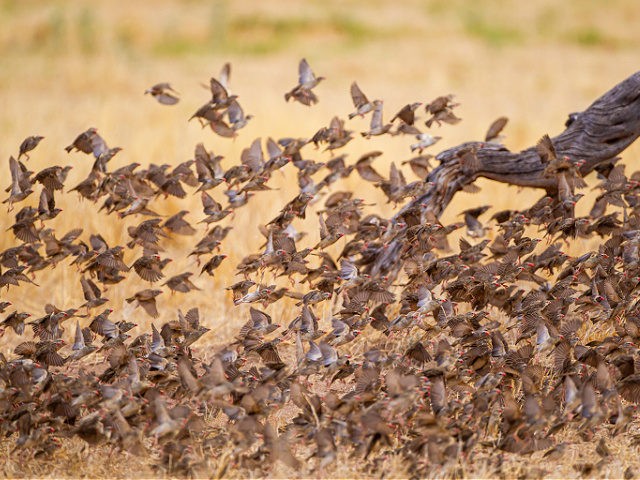Massive flocks of the red-billed quelea bird — a notorious African crop pest — have decimated grain harvests across farms in western Zimbabwe in recent weeks, causing fears of a local food shortage in the near future, the online newspaper New Zimbabwe reported Monday.
“Farmers in Umguza and Bubi farming areas in Matebeleland North province are struggling to contain a massive outbreak of quelea birds which are feasting on their crops, mainly small grains,” the publication reported on May 16.
“As a result of the invasion, the farmers, say they are now spending most of their time clanging metal objects and shouting at top of their voices in a desperate bid to save their crops [sic],” according to the newspaper.
Umguza and Bubi are districts within Zimbabwe’s Matabeleland North province, which itself is located in western Zimbabwe.
Lavenda Ndlovu, a farmer in Bubi district, told New Zimbabwe on May 16 that he fears the local quelea infestation may lead to crop deficits.
“We are appealing to the government to do something before the birds destroy more crops. A lot of farmers in this area were last year contracted to grow small grains by a local company. Now this outbreak is going to leave a lot of farmers with a crop deficit [sic],” Ndlovu said.
Quelea birds — which are known to flock by the thousands — have been attacking grain harvests not only in Matabeleland North province but across Zimbabwe in recent weeks, according to recent comments by Shingirai Nyamutukwa, who heads the Zimbabwean agriculture ministry’s migratory pest security department.
New Zimbabwe recalled on May 16 that Nyamutukwa “said at a farmer’s winter wheat training workshop at Combe Farm in Zvimba that the issue was reaching crisis levels.” Zvimba is a district of north-central Zimbabwe’s Mashonaland West Province.
Zimbabwe’s state-run Plant Protection and Research Institute (PPRI) said on January 6 that it had received an undisclosed number of reports from farmers across Zimbabwe, but especially in the country’s “Midlands” area, concerning quelea infestations of “early planted maize [corn] crops.”
Shingirai Nyamutukwa, a director of the PPRI, told Zimbabwe’s the Herald newspaper at the time his department had “acquired 7,410 litres of chemicals to deal with the birds,” adding, “We normally buy 5,000 litres which last up to three seasons.”
During a previous bout of quelea infestations in September 2021, the Herald quoted Nyamutukwa as saying the PPRI had then recently imported chemical pesticides from Kenya and China to supplement Zimbabwe’s insufficient pesticide stores.
“Chemicals have started trickling into the country from Kenya as we intensify efforts to control marauding quelea birds which are destroying the country’s winter wheat crop,” Nyamutukwa said at the time.
“We received chemicals over the weekend and the bulk of the chemicals are expected from today onwards. We are expecting to receive about 1 000 litres from Kenya and about 5000 litres from China [sic],” he revealed.
Zimbabwe is a severely impoverished nation that has struggled to combat increased crop plagues over the past few years.
“This year alone Zimbabwe has recorded several shocks and hazards mainly [due to] the Covid 19 [Chinese coronavirus] pandemic, crop pests, food insecurity, and livestock diseases,” the International Federation of Red Cross and Red Crescent Societies (IFRC) reported in November 2021.
“In September 2021, the estimated number of people [in Zimbabwe] with insufficient food consumption increased by 100 000 to about 5.7 million from 5.6 million estimated in August 2021 [sic],” according to the aid agency.
“During the January to March 2022 lean season, about 27% of rural Zimbabweans will be food insecure. This translates to 2,942,897 individuals, who collectively require 262,856 tons of maize,” the IFRC predicted at the time. “The country will likely face several emergencies, and this will be exacerbated by the low coping capacities of the most vulnerable communities due to the economic hardships the country is currently facing.”
Zimbabwe’s recent food shortages are noteworthy because the nation was previously known as the breadbasket of Africa before the devastating rule of Robert Mugabe, who occupied the nation’s office of the prime minister from 1980 to 1987 and the nation’s office of the presidency from 1987 to 2017. Mugabe’s nearly 40-year rule over Zimbabwe’s government was characterized by extreme mismanagement and corruption. The leftist dictator enforced so-called land “reforms” beginning in 2000 that severely damaged the country’s once-flourishing agricultural output.
“Starting in 2000, thousands of white Zimbabwean farmers were forced off their land by violent state-backed mobs or evicted in dubious legal judgments, supposedly to help black people marginalized under British colonial rule,” Agence France-Presse (AFP) recalled in July 2018. “The farms, however, were often allocated to [then] President Robert Mugabe’s allies [with no knowledge of farming] and fell into ruin, leaving tens of thousands of rural laborers out of work and sending the economy into a tailspin as food production crashed.”

COMMENTS
Please let us know if you're having issues with commenting.